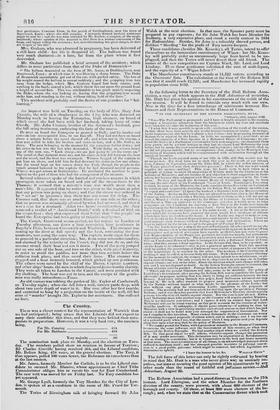Cbt
There was a closer contest for the representation of Warwick than we had anticipated ; being awate that the Liberals did not expect to carry their candidate this time, and that they were behind their anta- gonists in prepai ation. However, it was a very hard run; the numbers
being, For Mr. Canning 4(34 For Mr. Hohhouse 434 Tory majority 30 The nomination took place on Monday, and the election 00 Tues- day. The numbers polled show no reaction in favour of Toryism ; Sir Charles Greville having received 364, and the Liberal candidate, Mr. Bolton King, 478 votes, at the general election. The Tory, it thus appears, polled 100 votes fewer, the Reformer 44 votes fewer than at the last contest.
Mr. James, formerly Member for Carlisle, is to be the Liberal can- didate to succeed Mr. Blamire, whose appointment as Chief Tithe Commissioner obliges him to vacate his seat for East Cumberland. The new writ was moved for on Friday last. No Tory candidate has
yet appeared.
Mr. George Lyall, formerly the Tory Member for the City of Lon- don, is spoken of as a candidate in the room of Mr. rraed for Yar- mouth.
The Tories of Birmingham talk of bringing forward Sir John
Walsh at the next election. In that case, the Spooner party must be prepared to pay expenses; for Sir John Walsh has been Member for Sudbury, a very expensive place, and stood a costly contest in 1834 for Radnorshire. Besides, Sir John is a tolerably shrewd person, and dislikes " bleeding" for the profit of Tory tavern-keepers.
Three candidates (besides Mr. Kearsley), all Tories, intend to offer themselves to the immaculate constituency of Wigan: but Mr. Kears- ley will probably order an uncommonly large beer-barrel to be un. plugged, and then the Tories will never desert their old friend. The names of the new competitors are Captain Ward, Mr. Lord, and Lord Lindsay. Have these gentlemen calculated the cost of malt-liquor, and time capacity of a " Wigan fellow ?"
The Manchester constituency stands at 11,122 voters, according to the Overseers' lists. The calculation at the time of the Reform Bill was that it would reach 12,723; and Manchester has increased rapidly in population since 1832.


























 Previous page
Previous page